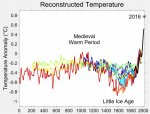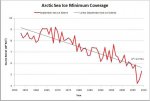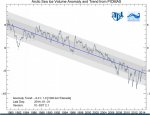Doc
Thanks for responding this time.
Like you I am a scientist though in my case Physics with Maths rather than Chemistry.
Like you I have no formal qualifications in climatology but I also follow the science with interest & try to listen to both sides of the argument.
You stated in a previous post that this isn't a technical scientific forum.
I agree that providing first hand source material here would not be appropriate.
It was for that reason that I gave 3 links which were intended to be understandable to everyone including those with little or no scientific knowledge.
The BBC article is presenting scientific data allowing readers to draw their own conclusions:
1. You criticised Greg for focusing on the 1970s onwards (though I don't agree that he did so). The BBC article covers the period from 1880 onwards.
It is true that there were little ice ages before that with the most recent being from around 1460 -1550 and again from 1645–1715. Both of those were at same time as other solar minimums . See e.g.
https://en.wikipedia.org/wiki/Little_Ice_Age.
By contrast, we are close to another solar minimum at the moment but the earth is still warming
There was another cold interval in the 19th century but less severe and it was well and truly over by the time the BBC data started in 1880. Yes, the data could have started earlier in time but inevitably the amount and accuracy of that data diminishes as you go further back in time.
Nevertheless, if you want a longer time period, the global temperature chart attached goes back to 0 AD
2/3/4/5 Your argument here seems to be that you can't deny the statistics but they are in your view irrelevant.
To summarise, because you don't believe that greenhouse gases including CO2 and CH4 are the cause, you suggest the data is of no consequence!
6. Agreed that Arctic ice is cyclic.
There was indeed a period of Arctic warming and consequent decline in ice from around 1920-1940 though I think that it is untrue to say the ice almost disappeared around 1926. I also believe the data from that period was incomplete with little from Russia.
See
https://judithcurry.com/2013/04/10/historic-variations-in-arctic-sea-ice-part-ii-1920-1950/
Arctic ice has definitely been in almost continuous decline since 1980 both in terms of minimum ice spread & ice volume.
Attached are two charts covering the period from 1980 - minimum ice spread & ice volume. I haven't found charts for say 1880 onwards. Perhaps someone else can do so
7. You are making the same dismissive point as for 2/3/4/5. It doesn't mean you are correct.
The other two articles (from 2016 & 2013 respectively) make it clear that scientific understanding of Antarctic sea ice volumes is still evolving. Both articles are in my view fairly objective - they don't just present evidence to support one side of the argument
Here are some of your other quotes from recent posts:
CO2 CAN be our friend because photosynthesis relies on it as a raw material. It has been shown that it enhances plant growth. (Why do botanists cause their greenhouses to have elevated CO2 levels? Rhetorical question.) Our hominid ancestors lived and evolved in an environment with THREE TIMES the amount of CO2 that is currently in our atmosphere. But we are still here.
Nobody is denying that CO2 is vital for plant life and therefore consequently for animal life.
Nor is anyone saying that humans couldn't survive if the CO2 levels were higher (within reasonable limits) if that increase didn't have any other side effects.
That is a non-argument
I have the ability to read an article and for most of them can see right away whether there was a bias in the article
Then why can't you do the same with all of the biased YouTube videos that you keep posting links for?
I remain a CO2 skeptic and do not intend to change that skepticism
I think that is clear. No amount of rigorous scientific evidence will sway your narrow and blinkered viewpoint on this matter
I realize you are desperately clinging to your beliefs
That was written with reference to Greg.
To my mind that applies to yourself. Others may say it applies to me as well
Finally (for now), I recommend you go to
https://www.skepticalscience.com
This has a clear remit as indicated in its strapline:
Getting skeptical about global warming skepticism.
It includes articles about just many of the arguments used by those who deny global warming exists or, like you, deny that it is significantly the result of CO2 emissions.
I am under no illusions that it will change your mind.
Indeed I'm sure you will be able to refute aspects of the evidence given.
However perhaps that will allow you to hone your own arguments more convincingly than you do now ... which in my opinion is not at all successfully.



